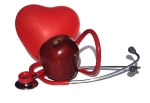Prevention Of Age Related Heart Diseases
Whatever stage of life you are in, it is time to care for your heart now. Doctors have long prescribed healthful eating and regular exercise to help care for the hardest working muscle in the body. Yoga, tai chi and other centuries old approaches are added to their prevention and treatment plans. There are some crucial steps to take in three stages in life:

Teens And Twenties:
Choose To Move: Teenage girls are more likely to be inactive than boys. Many sedentary young women blame their busy schedules. If a teenager does 30 minutes of exercise a day it can help strengthen the heart and keep cholesterol levels low. If they hate the gym, then they should go for something more engaging and social, such as flamingo classes, cycling, soccer, or ultimate frisbee.
Say No To Junk Food: Resisting the lure of spicy and high cholesterol fast food can make a big difference in your long term heart health. Although saturated fats have long been associated with cholesterol, sugar maybe similarly harmful. Sugary diets boost levels of triglycerides, a type of fat found in the blood. When tryglycerides are high, the levels of good cholesterol are low. High levels of this type of fat increase a woman’s lifetime risk of heart disease more than for men. In addition to avoiding sugar, steer clear of corn syrup and ingredients such as fructose and maltose. And cut back on refined carbohydrates such as white bread and instant rice, which your body quickly converts to sugar. To have a light snack, dip whole-grain pita wedges in garlicky hummus, top an oat cake with almond butter or feta cheese, or reach for a handful of cashews and dried cherries.

Banish Smoking Habits: Even with anti-smoking signs everywhere, more than 35 percent of female high school seniors smoke, that is up from 17% in 1991. Every drag of nicotine and carbon monoxide reduces the amount of oxygen in your blood, damages vessel walls, and may trigger the formation of stroke-inducing blood clots. If you want to quit, try a telephone based stop smoking program. They are free and they work. One study showed that telephone counseling roughly doubled abstinence rates, even 12 months after the smokers had given up cigarettes. The notion that you can get away with unhealthy habits in youth is as outdated as feathered hair. Besides the findings on early atherosclerosis, research shows that nearly a million American teenagers have another heart disease risk factor: metabolic syndrome, a condition marked by high blood sugar, high triglycerides, low cholesterol, and abdominal obesity. Girls and young women may be particularly vulnerable.
Chill Out: Carefree youth is a nice idea, but young person faces enormous pressures: social stress, getting into college, landing a first job. Starting a stress relief practice early can help put your heart health on course for life. Find a yoga class that suits your style. Confide in someone you trust, journal writing has been shown to help ease stress.

Thirties And Fourties:
The prevalence of heart disease is similar at this time both for men and women. This is the time, then, to make heart-health basics part of your day-to-day life: Find an exercise you enjoy, don’t smoke, and stick to an anti-inflammatory diet (rich in vegetables and fruits, whole grains, omega-3 fatty acids, and olive oil; low in saturated fats and processed and fried foods). While you’re at it, consider making the following changes.
Take Stress Relief Seriously: Caring for your family, building your career, and taking care of aging parents-either single handedly or simultaneously-can feel like overload. As a result, self-care often gets short shrift. This is the period in which a person is caught up n the trying-to-get-everything-done syndrome. Day to day stress is bad news for your heart, it causes the adrenal glands to pump out cortisol, a hormone that pushes up blood pressure and strains the heart and blood vessels. What you should do is prioritize your schedule so you are not left out of your own life. Set aside 15 minutes each morning for a brisk walk, sign up for a regular seated meditation practice, using your wandering mind. Meditating twice a day for 20 minutes at a time for four months lowered blood pressure significantly.
Find A New Doctor: Find a primary health-care provider you trust to help manage your cardiac health and other important issues. Select a doctor based on your mind-set. If you are seeking a complimentary, holistic approach to your health care, find a doctor who will do the same. Ask like minded friends for referrals.

Get Tested: Your annual exam should include a full blood work up to measure total cholesterol, levels of good and bad cholesterol, and triglycerides. Other tests, such as one for C-reactive protein (a blood protein that rises when inflammation is present), may be warranted, especially if you have a family history of cardiac disease. Having a first-degree relative (a mother, father or sibling) who died of a heart attach before age 55 increases your risk of heart disease, especially if the relative was female.
Nudge Your Numbers: Improve your stats by eating less animal protein and consuming more fish and plant-based foods. Soy protein is recommended for heart health. If you don’t like plain tofu, snack on edamame (fresh soy-beans), or mix some soft silken tofu into fruit smoothies. Eating just two ounces of oats daily for one month lowered cholesterol levels by 7 percent. Groats (crushed grains of various cereals) retain most of their original nutrients, plus their high soluble fiber content helps flush out bad cholesterol.
Think Before You Drink: Although the health properties of red wine have been widely reported, you can reap the benefits (but miss the risks of alcohol) simply by eating grapes, which contain substances that reduce inflammation and may reduce the risk of blood clots. If you are a wine and caffeine drinker, keep levels low as it causes cardiac irregularities. Do not have more than two cups of coffee and one glass of wine a day.

Plan For Hormonal Change: There is a hormonal change in men that corresponds to the hormonal change in women known as menopause. Like the way women’s estrogen levels drop after a certain age, men’s testosterone levels decrease with age. This male condition is known as andropause. lifestyle changes, such as exercise, a healthier diet and the elimination of alcohol is what is required for a healthier heart in the case for a man. Better overall health can help alleviate the symptoms of low testosterone. There are also some herbal remedies that can help. Vitamins C and E and zinc can help increase testosterone production. A woman should take vitamin C (1,000 mg twice daily) and vitamin B5 (250 mg twice daily) plus including plenty of sweet potato, legumes, and whole grains in her diet to boost adrenal function.